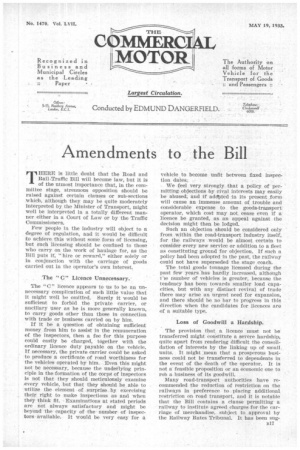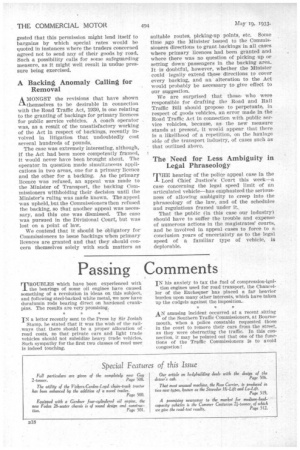Amendments to the Bill
Page 31

Page 32

If you've noticed an error in this article please click here to report it so we can fix it.
THERE is little. doubt that the Road and Rail‘Traffic Bill will become law, but it is of the utmost importance that, in the committee stage, strenuous opposition should be raised against certain clauses or sub-sections 'which, although they may be quite moderately Interpreted by the Minister of Transport, might well be interpreted in a totally different manner either in a Court of Law or by the Traffic Commissioners.
Few people in the industry will object to a degree of regulation, and it would be difficult to achieve this without some form of licensing, but such licensing should be confined to those who carry on the work of haulage for, as the Bill puts it, ." hire or reward," either solely or in conjunction with the carriage of goods carried out in the operator's own interest.
The "C" Licence Unnecessary.
The "C" licence appears to us to be an unnecessary complication of such little value that it might well be omitted. Surely it would be sufficient to forbid the private carrier, or ancillary user as he is more generally known, to carry goods other than those in connection with trade or business carried on by him.
If it be a question of obtaining sufficient money from him to assist in the remuneration of the inspectors, then a fee for this purpose could easily be charged, together with the ordinary licence duty payable on the vehicle. If necessary, the private carrier could be asked to produce a certificate of road worthiness for the vehicles operated by him. Even this might not be necessary, because the underlying principle in the formation of the corps of inspectors is not that they should meticulously examine every vehicle, but that they should be able to utilize the element of surprise by exercising their right to make inspections as and when they think fit. Examinations at stated periods are not always satisfactory and might be beyond the capacity of the number of inspectors available. It would be very easy for a vehicle to become unfit between fixed inspection dales: -We -feel very strengly, that a policy of permitting objections by -rival interests may easily be abused, and if aderpted in its present form will cause an immense amount of trouble and considerable expense to the goods-transport operator, which cost may not cease even if a licence be granted, as an appeal against the decision might then be lodged.
Such an objection should be considered only from within the road-transport industry itself, for the railways would be almost certain to .consider every new service or addition to a fleet as constituting ground for objection. If such a policy had been adopted in the past, the railway could not have superseded the stage coach.
The total goods tonnage licensed during the past few years has hardly increased, although fle number of vehicles is greater, because the tendency has been towards smaller load capacities, but with any distinct revival of trade there may arise an urgent need for expansion, and there should be no bar to progress in this direction when the candidates for licences are of a suitable type.
Loss of Goodwill a Hardship.
The provision that a licence must not be transferred might constitute a severe hardship, quite apart from rendering difficult the consolidation of interests by the linking up of small, units. It might ,mean that a prosperous business could not be transferred to dependents in the event of the death of the operator. It is not a feasible proposition or an economic one to rob a business of its goodwill.
Many road-transport authorities have recommended the reduction of restriction on the railways in preference to placing additional restriction on road transport, and it is notable that the Bill contains a clause permitting a railway to institute agreed charges for the carriage of 'merchandise, subject to approval by the Railway Rates Tribunal. It has been sug gested that this permission might lend itself to bargains by which special rates would be quoted in instances where the traders concerned agreed not to send any of their goods by road. Such a possibility calls for some safeguarding measure, as it might well result in undue pressure being exercised.
A Backing Anomaly Calling for Removal
A MONGST the revisions that have shown El-themselves to be desirable in connection with the Road Traffic Act, 1930, is one relating to the granting of backings for primary licences for public service vehicles. A coach operator was, as a result of the unsatisfactory working of the Act in respect of backings, recently involved in litigation that undoubtedly cost several hundreds of pounds.
The case was extremely interesting, although, If the Act had been more competently framed, it would never have been brought about. The operator, in question made simultaneous applications in two areas, one for a primary licence and the other for a backing. As the primary licence was refused, an appeal was made to the Minister of Transport, the backing Commissioners withholding their decision until the Minister's ruling was made known. The appeal was upheld, but the Commissioners then refused the backing, so that another appeal was necessary, and this one was dismissed. The case was pursued in the Divisional Court, but was lost on a point of law.
We contend that it should be obligatory for Commissioners to issue backings when primary licences are granted and that they should concern themselves solely with such matters as suitable routes, picking-up points, etc. Some time ago the Minister issued to the Commissioners directions to grant .backings in all cases where primary licences had been granted and where there was no question of picking up or setting downpassengers in the backing area. It is doubtful, however, whether the Minister could legally extend those directions. to cover every backing, and an alteration to the Act would probably be necessary to give effect to our suggestion.
We are surprised that those who were responsible for drafting the Road and Rail Traffic Bill should propose to perpetuate, in respect of goods vehicles, an error made in the Road Traffic Act in connection with public service vehicles, because, as the new measure stands at present, it would appear that there is a likelihood of a repetition, on the haulage side of the transport indutry, of cases such as that outlined above.
The Need for Less Ambiguity in Legal Phraseology
THE hearing of the pollee appeal case in the Lord Chief Justice's • Court this week—a case concerning the legal speed limit of an articulated vehicle—has emphasized the seriousness of allowing ambiguity to creep into the phraseology of the law, and of the schedules and regulations framed under it., That the public (in this ease our Industry) should have to suffer the trouble and expense of numerous actions in the magistrates' courts, and be involved in appeal cases to force to a conclusion years of uncertainty as to the legal speed of a familiar type of vehicle, is deplorable.




























































































